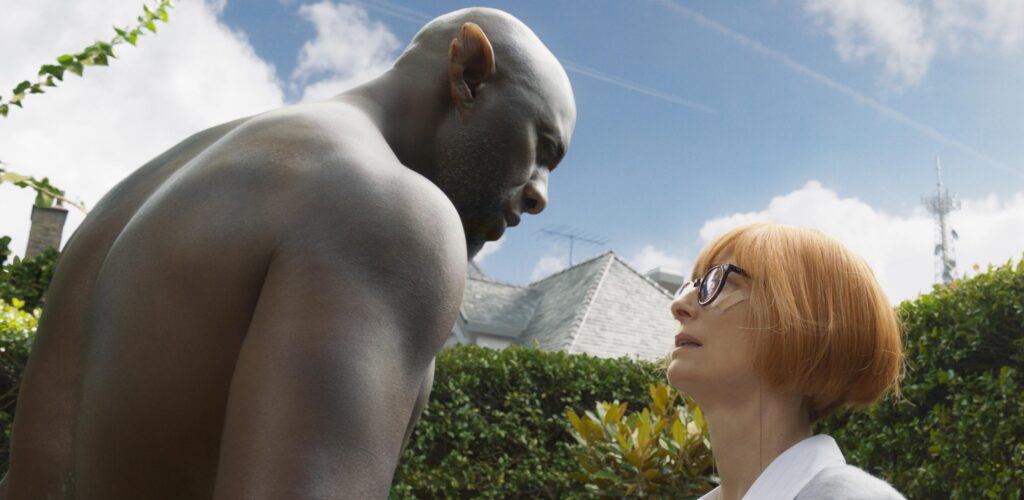By Alex McPherson
Wildly creative and packed with fascinating ideas, director George Miller’s “Three Thousand Years of Longing” is uneven, yet never less than intriguing.
Based on the short story “The Djinn in the Nightingale’s Eye” by A.S. Byatt, the film centers around Alithea Binnie (Tilda Swinton), an all-business-no-pleasure narratologist who travels to Istanbul to give a presentation on storytelling. Alithea has convinced herself that she’s perfectly content being immersed in her work without much of a social life to speak of.
Additionally, Alithea sees visions of spirits from time to time — one older gent, clad in a white robe, angrily floats toward her during her talk and she promptly faints, for example — but blames the phenomenon on her imagination. After purchasing an antique bottle at a bazaar, she finds that she’s actually in possession of a Djinn (Idris Elba), who emerges as a hulking figure, complete with pointy ears and golden dust, that barely fits in Alithea’s hotel room. The Djinn, soon shrinking down in size, is a stoic, contemplative, and world-weary being that needs Alithea’s help.
Alithea learns that she must let the Djinn fulfill three wishes (her heart’s desire) to grant his freedom. Unfortunately for the Djinn, Alithea doesn’t have anything to ask for— her “desire” has been repressed by cynicism and a solitary lifestyle that she insists suits her just fine. She’s also highly skeptical of the Djinn’s intentions. In order to prove himself, the Djinn proceeds to outline how he became trapped in the bottle, and presents three subsequent stories of wishes gone wrong.
It all begins with a love triangle involving the Djinn, the Queen of Sheba (Aamito Lagum), and the vengeful King Solomon (Nicolas Mouawad), who casts the fateful curse on the Djinn to take Sheba for himself. We’re then transported back to the 15th- and 16th-century Ottoman Empire in tales of magic, greed, madness, cutthroat machinations, and ridiculously bad luck, before one last story of the Djinn meeting a beautiful, intelligent Turkish merchant named Zefir (Burcu Gölgedar), and the turbulent bond that followed. Back in the hotel room, Alithea’s emotional barriers begin to weaken, and love might be in the air.
“Three Thousand Years of Longing” is nothing if not imaginative, coming from the mind that created the “Mad Max” and “Happy Feet” franchises. Miller’s direction remains as energetic, out-there, and distinctive as ever, but the film remains irritatingly distant. There’s plenty to think about regarding the power of stories to connect, enlighten, and give meaning to our lives; however, the film’s illustration of that idea lacks punch — a theme in need of stronger characters and tighter pacing.
Fortunately, even though “Three Thousand Years of Loving” never achieves the swooning heights it aspires to, Miller presents such a bizarre, unorthodox vision that it stays engaging throughout. The film’s strengths lie in those aforementioned flashbacks, complete with violence, treachery, jealousy, heartache, and heartbreak, each highlighting different morals relating to power and desire. Cinematographer John Seale captures sweeping, vibrantly photographed palaces and their surrounding landscapes. This includes surreal touches like an instrument that plays itself, a sinister figure whose head erupts into spiders, and first-person-POV shots of the Djinn as he wispily floats throughout winding chambers, trying to lure someone back to the bottle he’s stuck in. It’s difficult to become attached to anyone specific in these sequences — largely due to Elba’s pervasive narration — but they’re still inventive, possessing Miller’s characteristic flair for the idiosyncratic and darkly comedic.
The happenings of Alithea and the Djinn are far less interesting. Swinton does a fine job portraying a reserved, closed-off individual, but her arc seems rushed, coming across as abrupt and awkward in the final stretch. Since most of the film takes place in flashbacks, the present-day drama is sidelined, and Alithea’s evolution isn’t given the attention it needed to earn the heavy-handed payoff. Elba is typically great, but his dry, stoic line readings (in keeping with his character) aren’t the most dynamic or attention-grabbing. His chemistry with Swinton is similarly hamstrung by the screenplay, making their romance difficult to become enraptured by.
All that being said, “Three Thousand Years of Longing” is worth a look for Miller’s unconventional narrative and visual flair, despite a resolution that left me wanting — longing, in fact — for something greater.
“Three Thousand Years of Longing” is a 2022 fantasy-drama-romance directed by George Miller and starring Tilda Swinton and Idris Elba. It is rated R for some sexual content, graphic nudity, and brief violence and runs 1 hour, 48 minutes. It opened in theaters Aug. 26. Alex’s Grade: B-

Alex McPherson is an unabashed pop culture nerd and a member of the St. Louis Film Critics Association.

